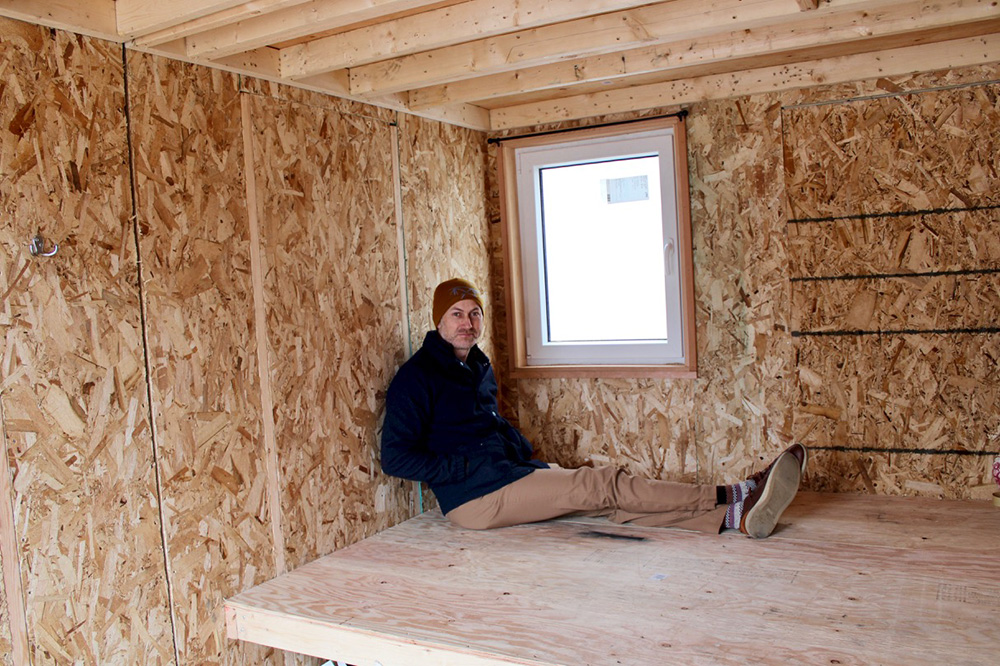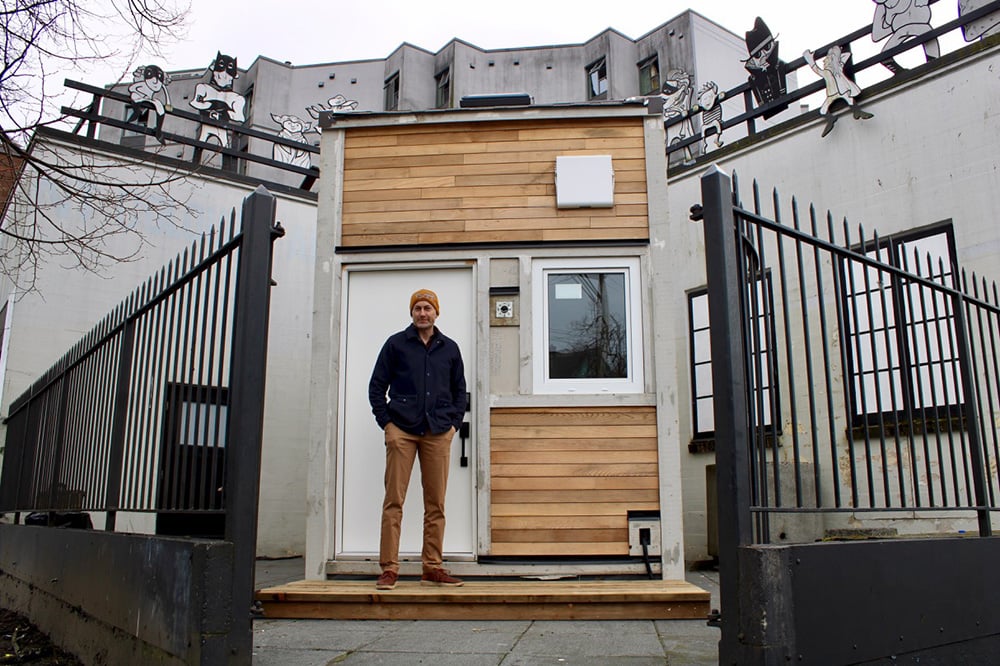A Vancouver homebuilder has set up a tiny house in the Downtown Eastside to demonstrate how the simple building could be used as part of the solution to homelessness.
Bryn Davidson designed the “tiny townhome” and built a prototype in December, after floating the idea of putting up to 10 of the structures on a typical residential lot to provide temporary housing for people who might otherwise be living in tents.
After building the prototype, Davidson started looking for a place to set it up. Working with Sarah Blyth, the founder of the Overdose Prevention Society, Davidson found a home for the tiny townhouse at Chapel Arts, an arts space at 305 Dunlevy Ave. right across from Oppenheimer Park.
No one will be living in the structure, but the plan is to use it as an artist’s studio and as a demonstration site for city councillors, non-profit organizations, builders, developers and others who might be interested in taking a look inside.
“We really hope that the city can look at this as a way to collaborate with community groups and the building industry,” said Davidson, who is the owner of Lanefab Design/Build.
“Because there are a lot of people who really want to do something. And the city’s typical approach to providing housing really doesn’t leave many ways for people to contribute.”
Large tent cities have become semi-permanent features in many Canadian cities, and during the COVID-19 pandemic, homelessness has risen. Last May, the provincial government attempted to remove tent cities from Vancouver and Victoria by buying or leasing hotels and motels.
But while hundreds of people were housed, the initiative didn’t eradicate large encampments. In Vancouver, a tent city was removed from Oppenheimer Park, but another camp quickly formed in nearby Strathcona Park.
In October, Vancouver city council approved using $30 million of city funds to buy or lease hotels and motels to quickly house people. It’s also using $51.5 million from the federal government.
Council opted for that approach over options like creating a managed camp or setting up a tiny home village. But so far just one 65-unit hotel has been purchased and it will be eight months before it’s ready to house people.
Another city council motion from Coun. Pete Fry asked city staff to look at what zoning and building code regulations would have to change to allow tiny homes.
But Davidson doesn’t expect to see any actual changes to the building code or zoning until summer 2021 at the earliest.
Vancouver city staff have voiced concerns about fire safety and livability in the small homes, which don’t have their own bathrooms or kitchens. They’ve also warned that there are few sites in the city that would be suitable.

Davidson’s response is that a tiny home would be warmer and safer than a tent, and it’s not meant to be a permanent housing solution.
Davidson’s prototype has plywood walls, a platform for a bed, and a loft space above that could be used for storage or a second bed.
Skylights and several small windows bring in lots of light from outside. He’s also installed a mechanical ventilation system that keeps the air circulating, bringing fresh air in and drawing the old air out. The structure can also be hooked up to electrical power to provide light and heat.
Davidson says the tiny townhome is designed as a taller building to make use of a small footprint and be put next to other homes in a row-house configuration.
Davidson’s idea is to put a group of the homes on a site with shared bathroom and shower facilities. The prototype cost around $20,000 to build, but Davidson thinks that could be brought down to around $15,000.
Much of the cost of setting up the village would come from preparing the site and setting up the infrastructure to support the village.
Davidson says the next step is to find an appropriate site and the right community partners to set up a demonstration village.
“We’d need the city to be on board and say these are the requirements in terms of fire safety or whatever else, and be part of the team,” Davidson said. ![]()
Read more: Housing, Urban Planning + Architecture

















Tyee Commenting Guidelines
Comments that violate guidelines risk being deleted, and violations may result in a temporary or permanent user ban. Maintain the spirit of good conversation to stay in the discussion.
*Please note The Tyee is not a forum for spreading misinformation about COVID-19, denying its existence or minimizing its risk to public health.
Do:
Do not: